Cross-Cultural Management Issues at Hydro Generation: Report
VerifiedAdded on 2023/01/09
|11
|3190
|66
Report
AI Summary
This report analyzes the cross-cultural management challenges faced by Hydro Generation, focusing on the leadership styles of Brett Jones, organizational culture, and HRM practices. It identifies inconsistencies in Jones's leadership, including a lack of employee involvement and unclear roles, leading to high employee turnover. The report utilizes the Handy culture model and leadership theories (transactional and transformational) to examine these issues. Recommendations include encouraging employee input, delegating authority, and fostering a more supportive work environment. The report also addresses HRM and motivation issues, such as unethical practices and limited employee development opportunities. The report suggests implementing system theory to address HRM issues and improve employee motivation. The report aims to provide insights into improving cross-cultural management within Hydro Generation and enhancing employee satisfaction and organizational performance.
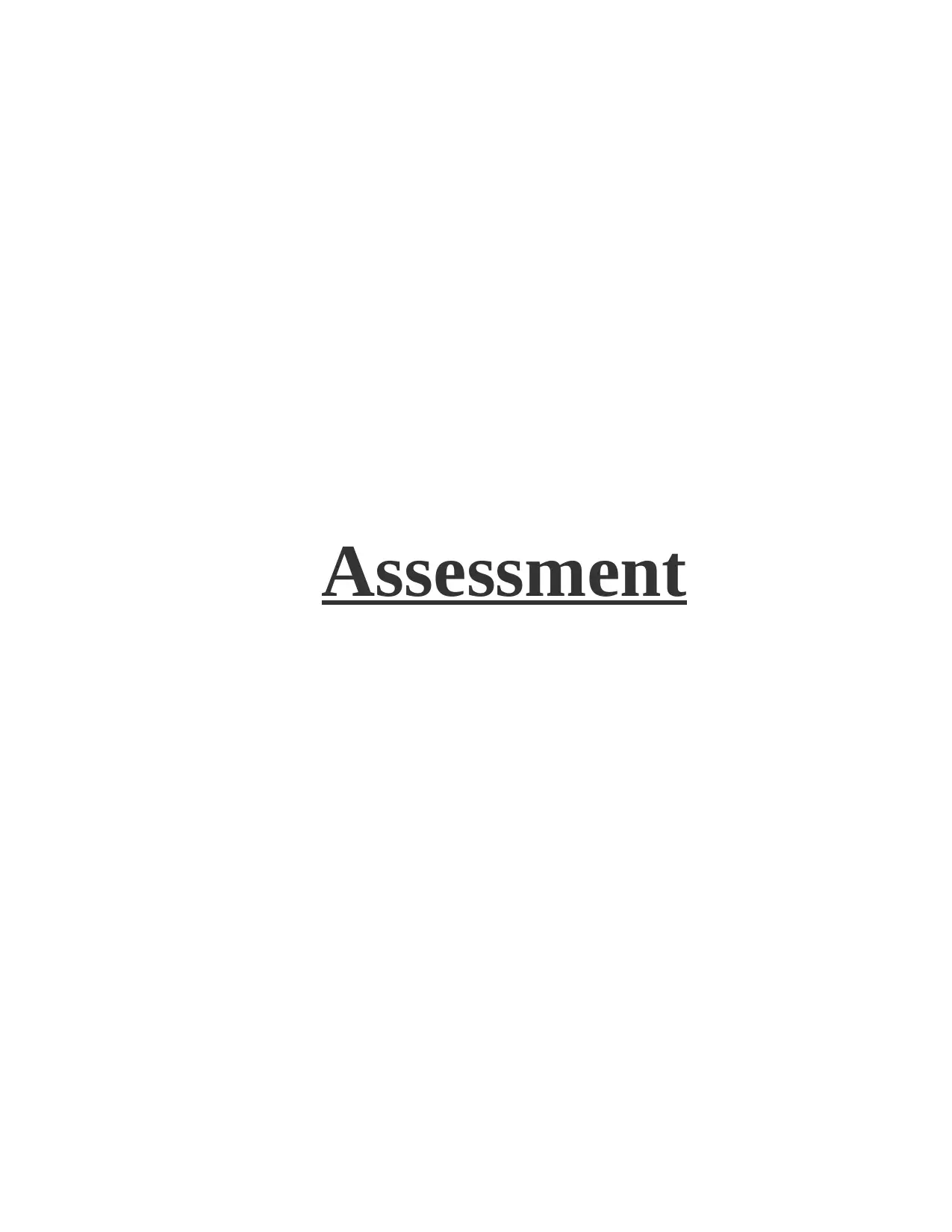
Assessment
Paraphrase This Document
Need a fresh take? Get an instant paraphrase of this document with our AI Paraphraser
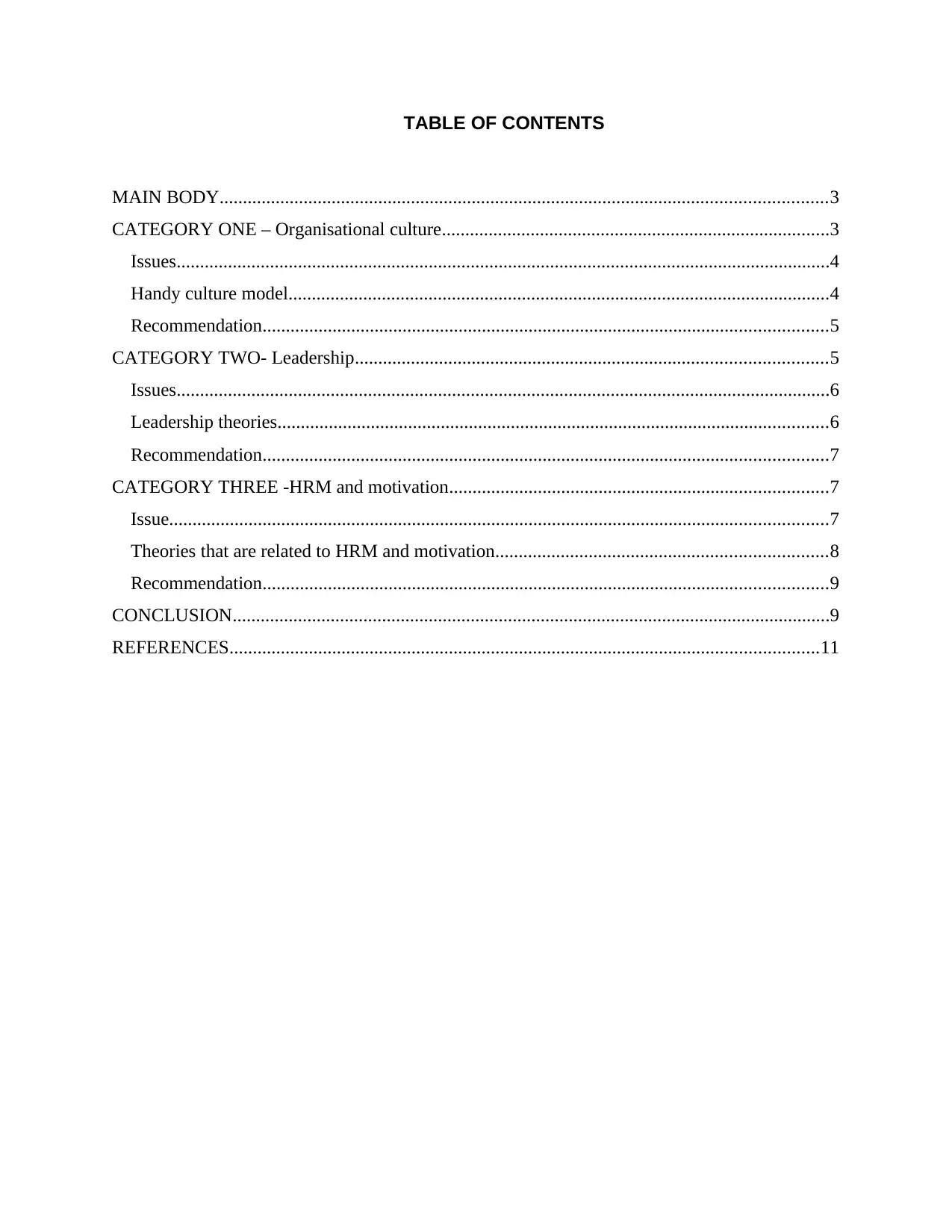
TABLE OF CONTENTS
MAIN BODY..................................................................................................................................3
CATEGORY ONE – Organisational culture...................................................................................3
Issues............................................................................................................................................4
Handy culture model....................................................................................................................4
Recommendation.........................................................................................................................5
CATEGORY TWO- Leadership.....................................................................................................5
Issues............................................................................................................................................6
Leadership theories......................................................................................................................6
Recommendation.........................................................................................................................7
CATEGORY THREE -HRM and motivation.................................................................................7
Issue.............................................................................................................................................7
Theories that are related to HRM and motivation.......................................................................8
Recommendation.........................................................................................................................9
CONCLUSION................................................................................................................................9
REFERENCES..............................................................................................................................11
MAIN BODY..................................................................................................................................3
CATEGORY ONE – Organisational culture...................................................................................3
Issues............................................................................................................................................4
Handy culture model....................................................................................................................4
Recommendation.........................................................................................................................5
CATEGORY TWO- Leadership.....................................................................................................5
Issues............................................................................................................................................6
Leadership theories......................................................................................................................6
Recommendation.........................................................................................................................7
CATEGORY THREE -HRM and motivation.................................................................................7
Issue.............................................................................................................................................7
Theories that are related to HRM and motivation.......................................................................8
Recommendation.........................................................................................................................9
CONCLUSION................................................................................................................................9
REFERENCES..............................................................................................................................11
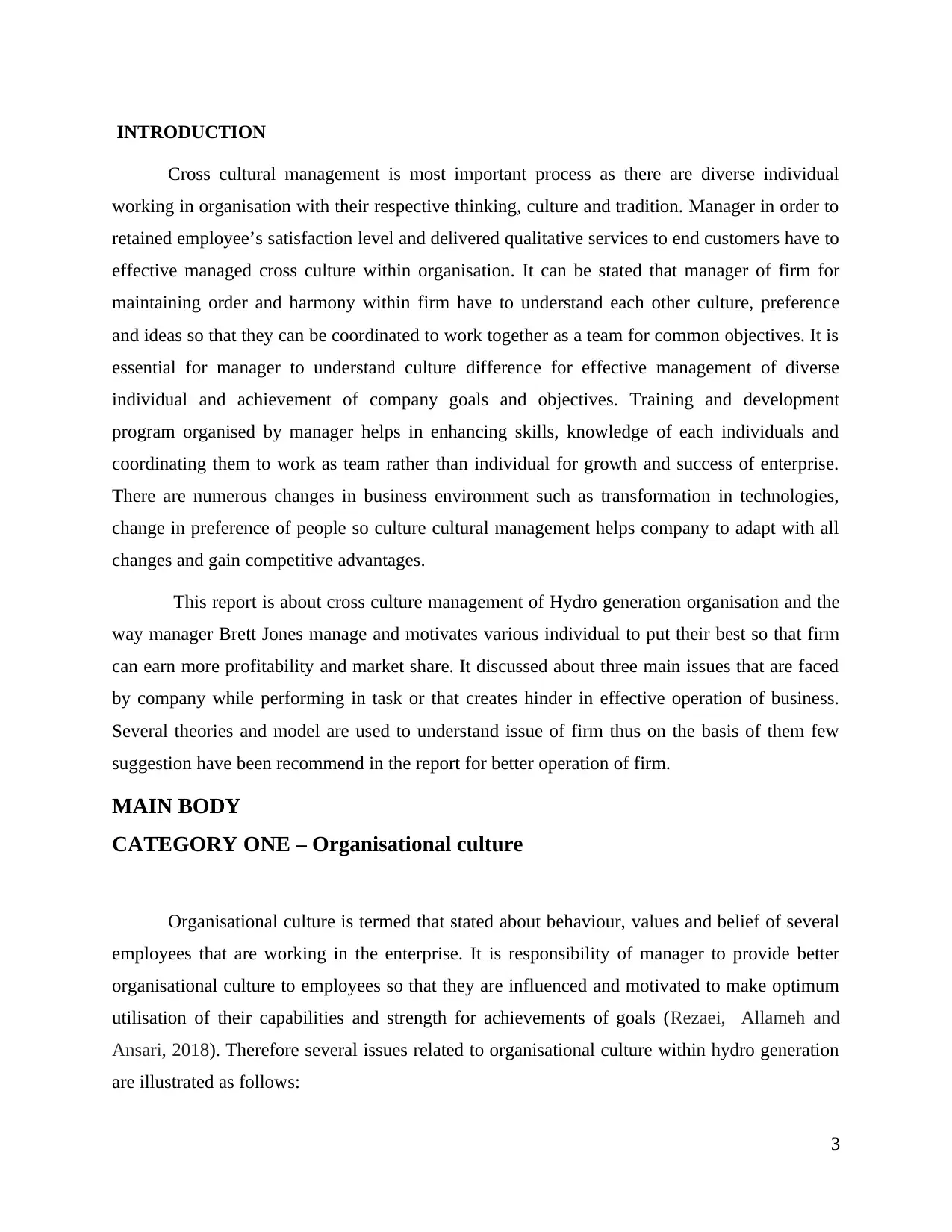
INTRODUCTION
Cross cultural management is most important process as there are diverse individual
working in organisation with their respective thinking, culture and tradition. Manager in order to
retained employee’s satisfaction level and delivered qualitative services to end customers have to
effective managed cross culture within organisation. It can be stated that manager of firm for
maintaining order and harmony within firm have to understand each other culture, preference
and ideas so that they can be coordinated to work together as a team for common objectives. It is
essential for manager to understand culture difference for effective management of diverse
individual and achievement of company goals and objectives. Training and development
program organised by manager helps in enhancing skills, knowledge of each individuals and
coordinating them to work as team rather than individual for growth and success of enterprise.
There are numerous changes in business environment such as transformation in technologies,
change in preference of people so culture cultural management helps company to adapt with all
changes and gain competitive advantages.
This report is about cross culture management of Hydro generation organisation and the
way manager Brett Jones manage and motivates various individual to put their best so that firm
can earn more profitability and market share. It discussed about three main issues that are faced
by company while performing in task or that creates hinder in effective operation of business.
Several theories and model are used to understand issue of firm thus on the basis of them few
suggestion have been recommend in the report for better operation of firm.
MAIN BODY
CATEGORY ONE – Organisational culture
Organisational culture is termed that stated about behaviour, values and belief of several
employees that are working in the enterprise. It is responsibility of manager to provide better
organisational culture to employees so that they are influenced and motivated to make optimum
utilisation of their capabilities and strength for achievements of goals (Rezaei, Allameh and
Ansari, 2018). Therefore several issues related to organisational culture within hydro generation
are illustrated as follows:
3
Cross cultural management is most important process as there are diverse individual
working in organisation with their respective thinking, culture and tradition. Manager in order to
retained employee’s satisfaction level and delivered qualitative services to end customers have to
effective managed cross culture within organisation. It can be stated that manager of firm for
maintaining order and harmony within firm have to understand each other culture, preference
and ideas so that they can be coordinated to work together as a team for common objectives. It is
essential for manager to understand culture difference for effective management of diverse
individual and achievement of company goals and objectives. Training and development
program organised by manager helps in enhancing skills, knowledge of each individuals and
coordinating them to work as team rather than individual for growth and success of enterprise.
There are numerous changes in business environment such as transformation in technologies,
change in preference of people so culture cultural management helps company to adapt with all
changes and gain competitive advantages.
This report is about cross culture management of Hydro generation organisation and the
way manager Brett Jones manage and motivates various individual to put their best so that firm
can earn more profitability and market share. It discussed about three main issues that are faced
by company while performing in task or that creates hinder in effective operation of business.
Several theories and model are used to understand issue of firm thus on the basis of them few
suggestion have been recommend in the report for better operation of firm.
MAIN BODY
CATEGORY ONE – Organisational culture
Organisational culture is termed that stated about behaviour, values and belief of several
employees that are working in the enterprise. It is responsibility of manager to provide better
organisational culture to employees so that they are influenced and motivated to make optimum
utilisation of their capabilities and strength for achievements of goals (Rezaei, Allameh and
Ansari, 2018). Therefore several issues related to organisational culture within hydro generation
are illustrated as follows:
3
⊘ This is a preview!⊘
Do you want full access?
Subscribe today to unlock all pages.

Trusted by 1+ million students worldwide
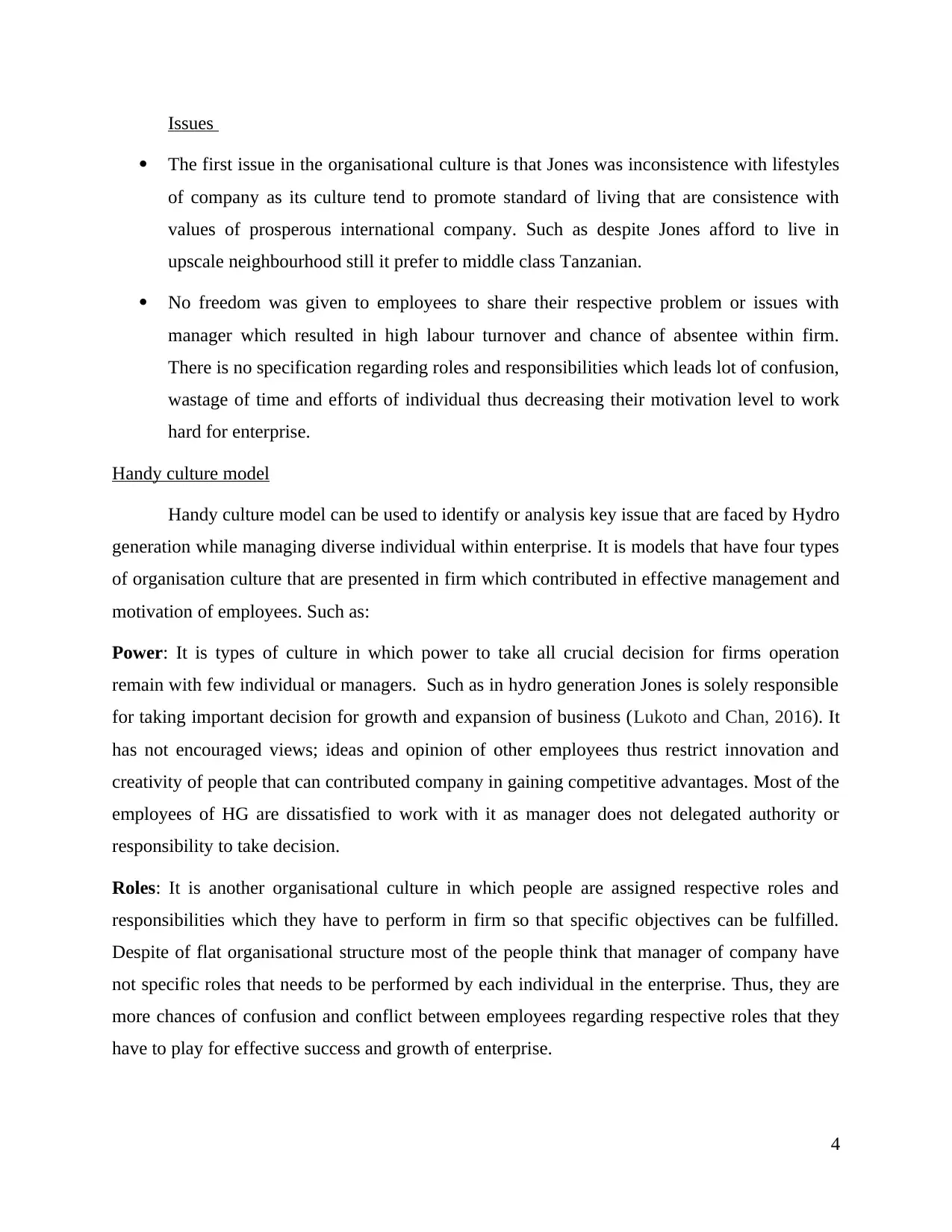
Issues
The first issue in the organisational culture is that Jones was inconsistence with lifestyles
of company as its culture tend to promote standard of living that are consistence with
values of prosperous international company. Such as despite Jones afford to live in
upscale neighbourhood still it prefer to middle class Tanzanian.
No freedom was given to employees to share their respective problem or issues with
manager which resulted in high labour turnover and chance of absentee within firm.
There is no specification regarding roles and responsibilities which leads lot of confusion,
wastage of time and efforts of individual thus decreasing their motivation level to work
hard for enterprise.
Handy culture model
Handy culture model can be used to identify or analysis key issue that are faced by Hydro
generation while managing diverse individual within enterprise. It is models that have four types
of organisation culture that are presented in firm which contributed in effective management and
motivation of employees. Such as:
Power: It is types of culture in which power to take all crucial decision for firms operation
remain with few individual or managers. Such as in hydro generation Jones is solely responsible
for taking important decision for growth and expansion of business (Lukoto and Chan, 2016). It
has not encouraged views; ideas and opinion of other employees thus restrict innovation and
creativity of people that can contributed company in gaining competitive advantages. Most of the
employees of HG are dissatisfied to work with it as manager does not delegated authority or
responsibility to take decision.
Roles: It is another organisational culture in which people are assigned respective roles and
responsibilities which they have to perform in firm so that specific objectives can be fulfilled.
Despite of flat organisational structure most of the people think that manager of company have
not specific roles that needs to be performed by each individual in the enterprise. Thus, they are
more chances of confusion and conflict between employees regarding respective roles that they
have to play for effective success and growth of enterprise.
4
The first issue in the organisational culture is that Jones was inconsistence with lifestyles
of company as its culture tend to promote standard of living that are consistence with
values of prosperous international company. Such as despite Jones afford to live in
upscale neighbourhood still it prefer to middle class Tanzanian.
No freedom was given to employees to share their respective problem or issues with
manager which resulted in high labour turnover and chance of absentee within firm.
There is no specification regarding roles and responsibilities which leads lot of confusion,
wastage of time and efforts of individual thus decreasing their motivation level to work
hard for enterprise.
Handy culture model
Handy culture model can be used to identify or analysis key issue that are faced by Hydro
generation while managing diverse individual within enterprise. It is models that have four types
of organisation culture that are presented in firm which contributed in effective management and
motivation of employees. Such as:
Power: It is types of culture in which power to take all crucial decision for firms operation
remain with few individual or managers. Such as in hydro generation Jones is solely responsible
for taking important decision for growth and expansion of business (Lukoto and Chan, 2016). It
has not encouraged views; ideas and opinion of other employees thus restrict innovation and
creativity of people that can contributed company in gaining competitive advantages. Most of the
employees of HG are dissatisfied to work with it as manager does not delegated authority or
responsibility to take decision.
Roles: It is another organisational culture in which people are assigned respective roles and
responsibilities which they have to perform in firm so that specific objectives can be fulfilled.
Despite of flat organisational structure most of the people think that manager of company have
not specific roles that needs to be performed by each individual in the enterprise. Thus, they are
more chances of confusion and conflict between employees regarding respective roles that they
have to play for effective success and growth of enterprise.
4
Paraphrase This Document
Need a fresh take? Get an instant paraphrase of this document with our AI Paraphraser
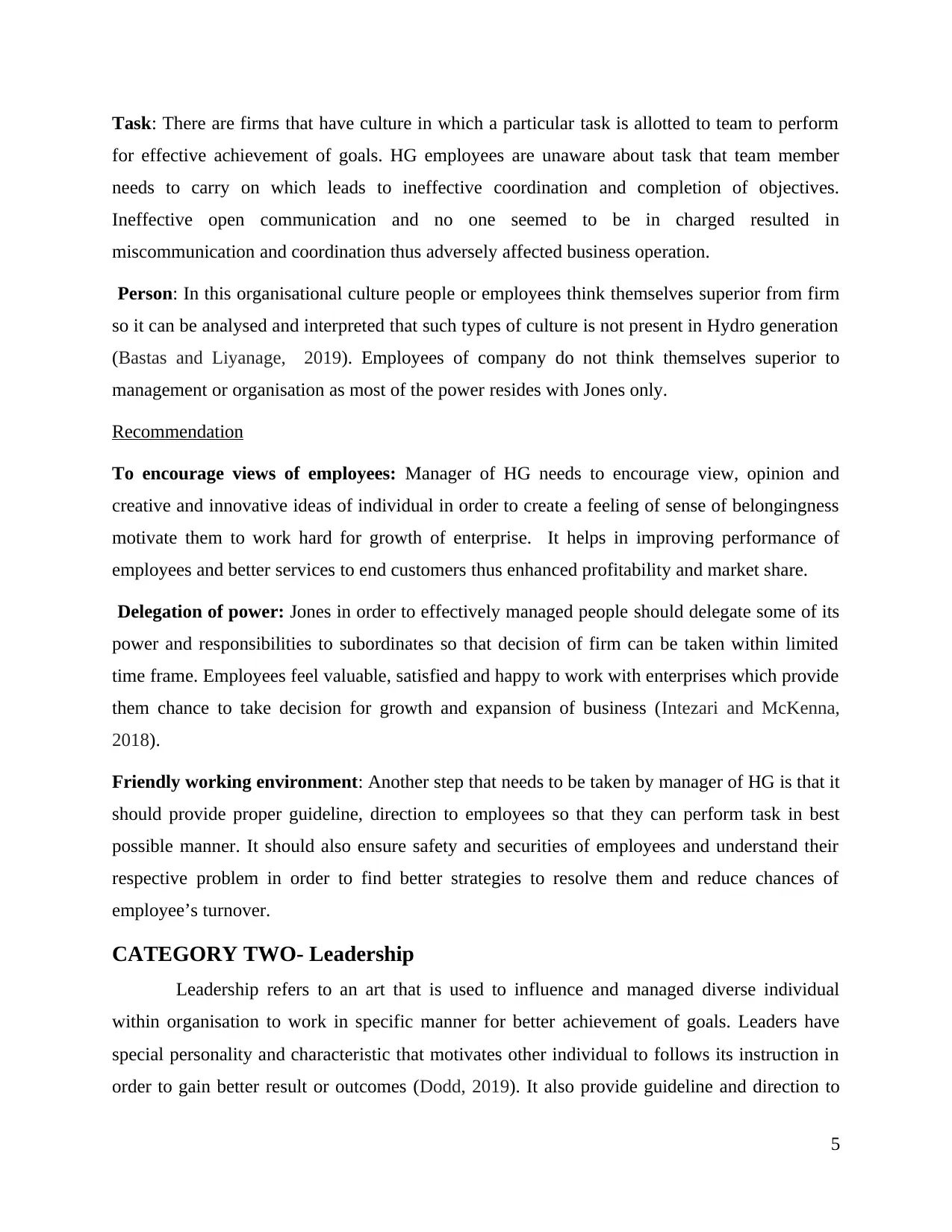
Task: There are firms that have culture in which a particular task is allotted to team to perform
for effective achievement of goals. HG employees are unaware about task that team member
needs to carry on which leads to ineffective coordination and completion of objectives.
Ineffective open communication and no one seemed to be in charged resulted in
miscommunication and coordination thus adversely affected business operation.
Person: In this organisational culture people or employees think themselves superior from firm
so it can be analysed and interpreted that such types of culture is not present in Hydro generation
(Bastas and Liyanage, 2019). Employees of company do not think themselves superior to
management or organisation as most of the power resides with Jones only.
Recommendation
To encourage views of employees: Manager of HG needs to encourage view, opinion and
creative and innovative ideas of individual in order to create a feeling of sense of belongingness
motivate them to work hard for growth of enterprise. It helps in improving performance of
employees and better services to end customers thus enhanced profitability and market share.
Delegation of power: Jones in order to effectively managed people should delegate some of its
power and responsibilities to subordinates so that decision of firm can be taken within limited
time frame. Employees feel valuable, satisfied and happy to work with enterprises which provide
them chance to take decision for growth and expansion of business (Intezari and McKenna,
2018).
Friendly working environment: Another step that needs to be taken by manager of HG is that it
should provide proper guideline, direction to employees so that they can perform task in best
possible manner. It should also ensure safety and securities of employees and understand their
respective problem in order to find better strategies to resolve them and reduce chances of
employee’s turnover.
CATEGORY TWO- Leadership
Leadership refers to an art that is used to influence and managed diverse individual
within organisation to work in specific manner for better achievement of goals. Leaders have
special personality and characteristic that motivates other individual to follows its instruction in
order to gain better result or outcomes (Dodd, 2019). It also provide guideline and direction to
5
for effective achievement of goals. HG employees are unaware about task that team member
needs to carry on which leads to ineffective coordination and completion of objectives.
Ineffective open communication and no one seemed to be in charged resulted in
miscommunication and coordination thus adversely affected business operation.
Person: In this organisational culture people or employees think themselves superior from firm
so it can be analysed and interpreted that such types of culture is not present in Hydro generation
(Bastas and Liyanage, 2019). Employees of company do not think themselves superior to
management or organisation as most of the power resides with Jones only.
Recommendation
To encourage views of employees: Manager of HG needs to encourage view, opinion and
creative and innovative ideas of individual in order to create a feeling of sense of belongingness
motivate them to work hard for growth of enterprise. It helps in improving performance of
employees and better services to end customers thus enhanced profitability and market share.
Delegation of power: Jones in order to effectively managed people should delegate some of its
power and responsibilities to subordinates so that decision of firm can be taken within limited
time frame. Employees feel valuable, satisfied and happy to work with enterprises which provide
them chance to take decision for growth and expansion of business (Intezari and McKenna,
2018).
Friendly working environment: Another step that needs to be taken by manager of HG is that it
should provide proper guideline, direction to employees so that they can perform task in best
possible manner. It should also ensure safety and securities of employees and understand their
respective problem in order to find better strategies to resolve them and reduce chances of
employee’s turnover.
CATEGORY TWO- Leadership
Leadership refers to an art that is used to influence and managed diverse individual
within organisation to work in specific manner for better achievement of goals. Leaders have
special personality and characteristic that motivates other individual to follows its instruction in
order to gain better result or outcomes (Dodd, 2019). It also provide guideline and direction to
5
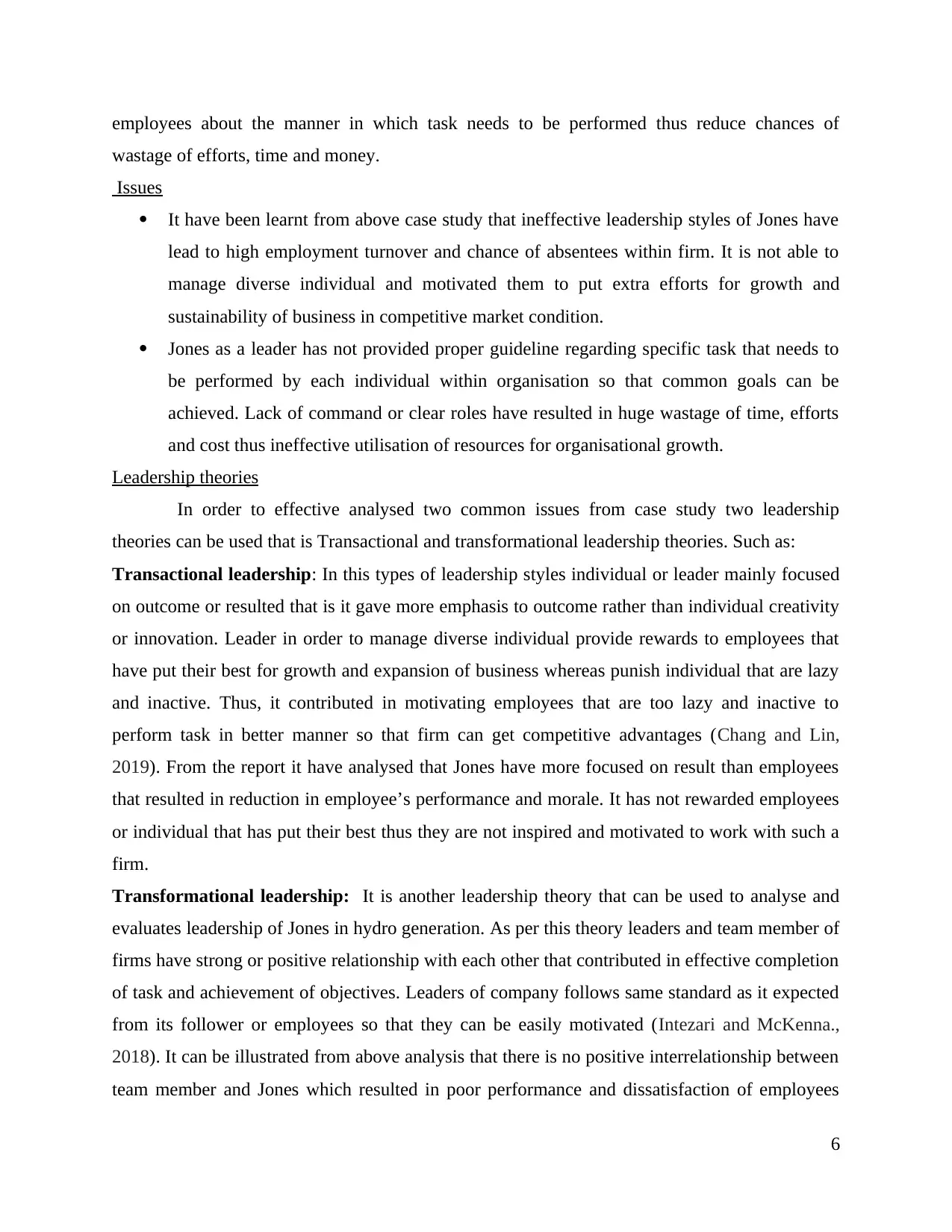
employees about the manner in which task needs to be performed thus reduce chances of
wastage of efforts, time and money.
Issues
It have been learnt from above case study that ineffective leadership styles of Jones have
lead to high employment turnover and chance of absentees within firm. It is not able to
manage diverse individual and motivated them to put extra efforts for growth and
sustainability of business in competitive market condition.
Jones as a leader has not provided proper guideline regarding specific task that needs to
be performed by each individual within organisation so that common goals can be
achieved. Lack of command or clear roles have resulted in huge wastage of time, efforts
and cost thus ineffective utilisation of resources for organisational growth.
Leadership theories
In order to effective analysed two common issues from case study two leadership
theories can be used that is Transactional and transformational leadership theories. Such as:
Transactional leadership: In this types of leadership styles individual or leader mainly focused
on outcome or resulted that is it gave more emphasis to outcome rather than individual creativity
or innovation. Leader in order to manage diverse individual provide rewards to employees that
have put their best for growth and expansion of business whereas punish individual that are lazy
and inactive. Thus, it contributed in motivating employees that are too lazy and inactive to
perform task in better manner so that firm can get competitive advantages (Chang and Lin,
2019). From the report it have analysed that Jones have more focused on result than employees
that resulted in reduction in employee’s performance and morale. It has not rewarded employees
or individual that has put their best thus they are not inspired and motivated to work with such a
firm.
Transformational leadership: It is another leadership theory that can be used to analyse and
evaluates leadership of Jones in hydro generation. As per this theory leaders and team member of
firms have strong or positive relationship with each other that contributed in effective completion
of task and achievement of objectives. Leaders of company follows same standard as it expected
from its follower or employees so that they can be easily motivated (Intezari and McKenna.,
2018). It can be illustrated from above analysis that there is no positive interrelationship between
team member and Jones which resulted in poor performance and dissatisfaction of employees
6
wastage of efforts, time and money.
Issues
It have been learnt from above case study that ineffective leadership styles of Jones have
lead to high employment turnover and chance of absentees within firm. It is not able to
manage diverse individual and motivated them to put extra efforts for growth and
sustainability of business in competitive market condition.
Jones as a leader has not provided proper guideline regarding specific task that needs to
be performed by each individual within organisation so that common goals can be
achieved. Lack of command or clear roles have resulted in huge wastage of time, efforts
and cost thus ineffective utilisation of resources for organisational growth.
Leadership theories
In order to effective analysed two common issues from case study two leadership
theories can be used that is Transactional and transformational leadership theories. Such as:
Transactional leadership: In this types of leadership styles individual or leader mainly focused
on outcome or resulted that is it gave more emphasis to outcome rather than individual creativity
or innovation. Leader in order to manage diverse individual provide rewards to employees that
have put their best for growth and expansion of business whereas punish individual that are lazy
and inactive. Thus, it contributed in motivating employees that are too lazy and inactive to
perform task in better manner so that firm can get competitive advantages (Chang and Lin,
2019). From the report it have analysed that Jones have more focused on result than employees
that resulted in reduction in employee’s performance and morale. It has not rewarded employees
or individual that has put their best thus they are not inspired and motivated to work with such a
firm.
Transformational leadership: It is another leadership theory that can be used to analyse and
evaluates leadership of Jones in hydro generation. As per this theory leaders and team member of
firms have strong or positive relationship with each other that contributed in effective completion
of task and achievement of objectives. Leaders of company follows same standard as it expected
from its follower or employees so that they can be easily motivated (Intezari and McKenna.,
2018). It can be illustrated from above analysis that there is no positive interrelationship between
team member and Jones which resulted in poor performance and dissatisfaction of employees
6
⊘ This is a preview!⊘
Do you want full access?
Subscribe today to unlock all pages.

Trusted by 1+ million students worldwide
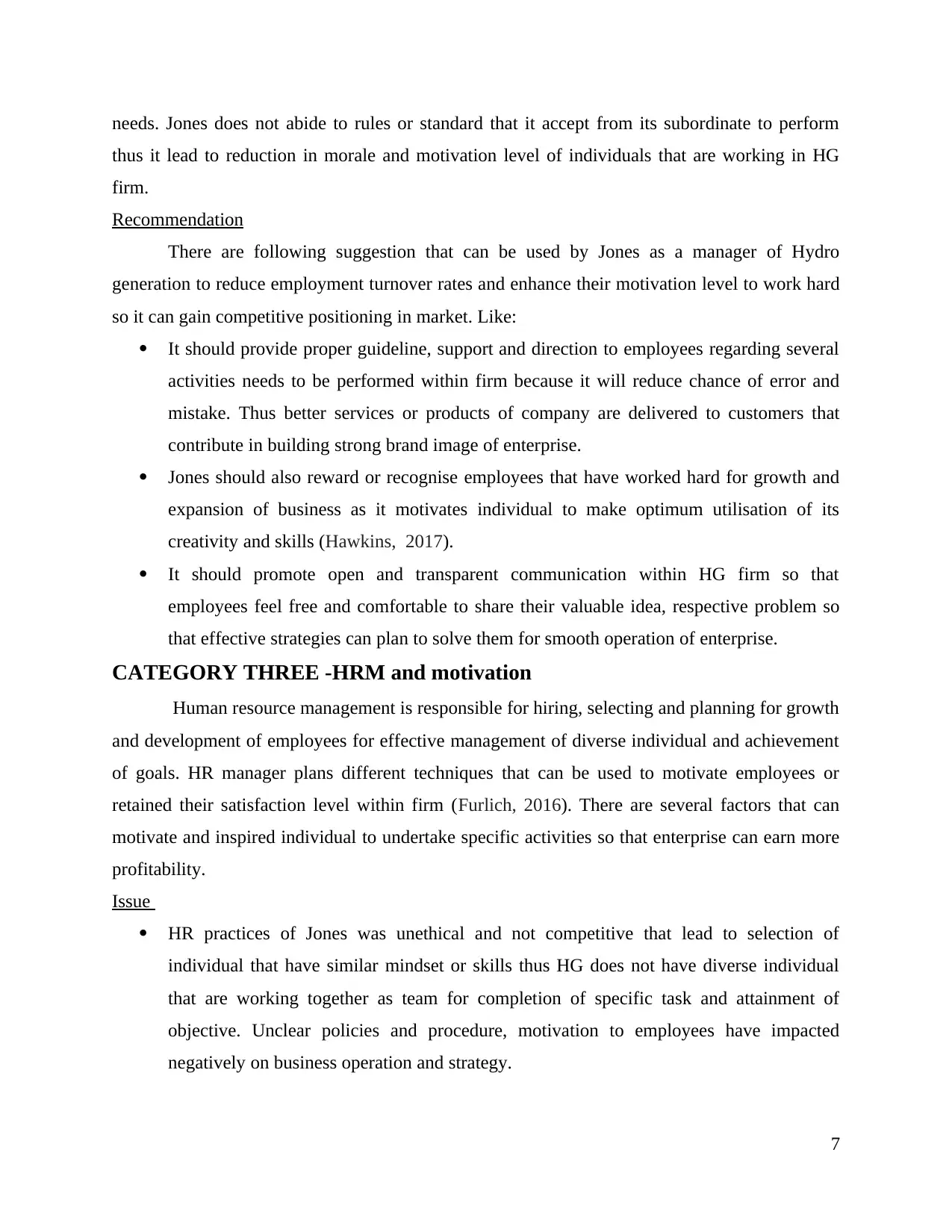
needs. Jones does not abide to rules or standard that it accept from its subordinate to perform
thus it lead to reduction in morale and motivation level of individuals that are working in HG
firm.
Recommendation
There are following suggestion that can be used by Jones as a manager of Hydro
generation to reduce employment turnover rates and enhance their motivation level to work hard
so it can gain competitive positioning in market. Like:
It should provide proper guideline, support and direction to employees regarding several
activities needs to be performed within firm because it will reduce chance of error and
mistake. Thus better services or products of company are delivered to customers that
contribute in building strong brand image of enterprise.
Jones should also reward or recognise employees that have worked hard for growth and
expansion of business as it motivates individual to make optimum utilisation of its
creativity and skills (Hawkins, 2017).
It should promote open and transparent communication within HG firm so that
employees feel free and comfortable to share their valuable idea, respective problem so
that effective strategies can plan to solve them for smooth operation of enterprise.
CATEGORY THREE -HRM and motivation
Human resource management is responsible for hiring, selecting and planning for growth
and development of employees for effective management of diverse individual and achievement
of goals. HR manager plans different techniques that can be used to motivate employees or
retained their satisfaction level within firm (Furlich, 2016). There are several factors that can
motivate and inspired individual to undertake specific activities so that enterprise can earn more
profitability.
Issue
HR practices of Jones was unethical and not competitive that lead to selection of
individual that have similar mindset or skills thus HG does not have diverse individual
that are working together as team for completion of specific task and attainment of
objective. Unclear policies and procedure, motivation to employees have impacted
negatively on business operation and strategy.
7
thus it lead to reduction in morale and motivation level of individuals that are working in HG
firm.
Recommendation
There are following suggestion that can be used by Jones as a manager of Hydro
generation to reduce employment turnover rates and enhance their motivation level to work hard
so it can gain competitive positioning in market. Like:
It should provide proper guideline, support and direction to employees regarding several
activities needs to be performed within firm because it will reduce chance of error and
mistake. Thus better services or products of company are delivered to customers that
contribute in building strong brand image of enterprise.
Jones should also reward or recognise employees that have worked hard for growth and
expansion of business as it motivates individual to make optimum utilisation of its
creativity and skills (Hawkins, 2017).
It should promote open and transparent communication within HG firm so that
employees feel free and comfortable to share their valuable idea, respective problem so
that effective strategies can plan to solve them for smooth operation of enterprise.
CATEGORY THREE -HRM and motivation
Human resource management is responsible for hiring, selecting and planning for growth
and development of employees for effective management of diverse individual and achievement
of goals. HR manager plans different techniques that can be used to motivate employees or
retained their satisfaction level within firm (Furlich, 2016). There are several factors that can
motivate and inspired individual to undertake specific activities so that enterprise can earn more
profitability.
Issue
HR practices of Jones was unethical and not competitive that lead to selection of
individual that have similar mindset or skills thus HG does not have diverse individual
that are working together as team for completion of specific task and attainment of
objective. Unclear policies and procedure, motivation to employees have impacted
negatively on business operation and strategy.
7
Paraphrase This Document
Need a fresh take? Get an instant paraphrase of this document with our AI Paraphraser
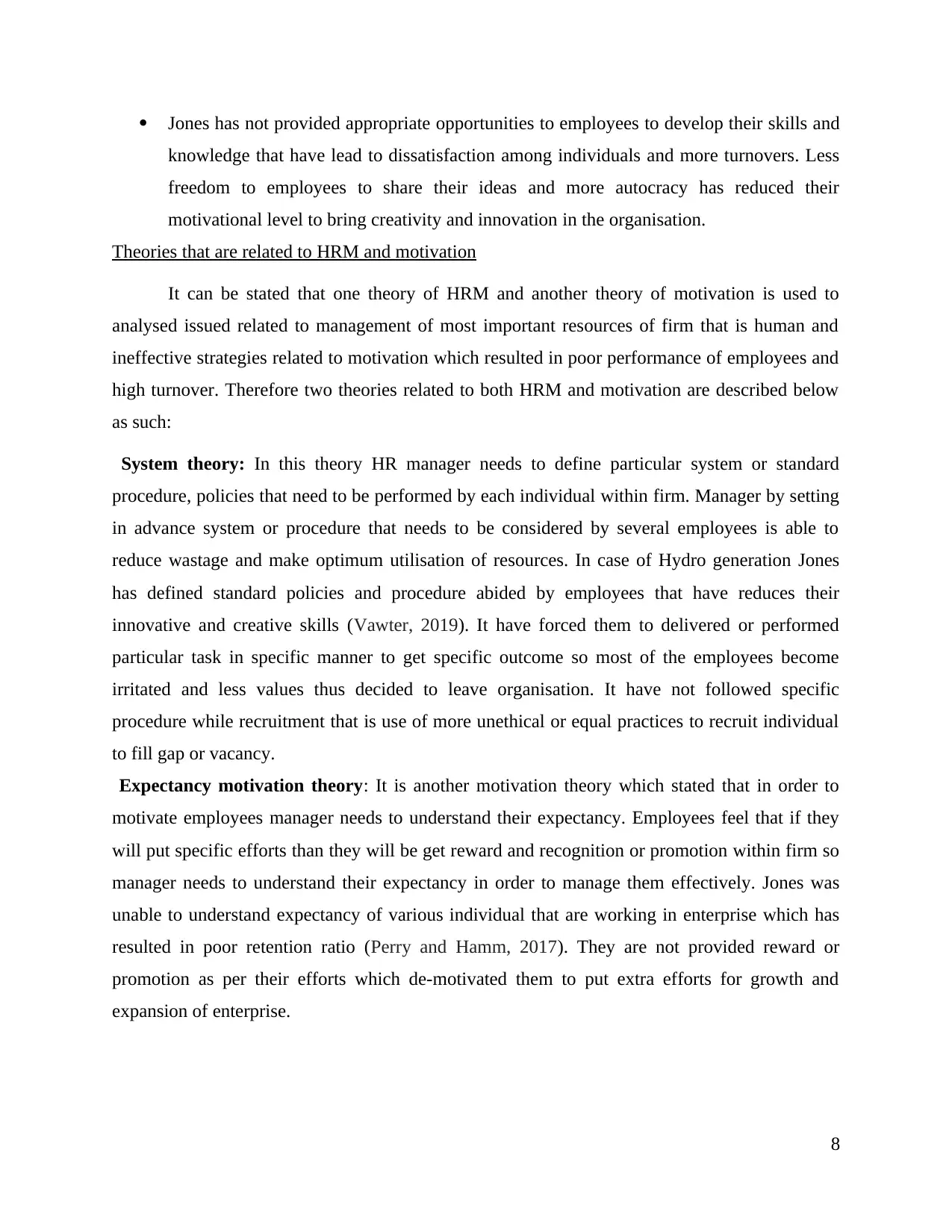
Jones has not provided appropriate opportunities to employees to develop their skills and
knowledge that have lead to dissatisfaction among individuals and more turnovers. Less
freedom to employees to share their ideas and more autocracy has reduced their
motivational level to bring creativity and innovation in the organisation.
Theories that are related to HRM and motivation
It can be stated that one theory of HRM and another theory of motivation is used to
analysed issued related to management of most important resources of firm that is human and
ineffective strategies related to motivation which resulted in poor performance of employees and
high turnover. Therefore two theories related to both HRM and motivation are described below
as such:
System theory: In this theory HR manager needs to define particular system or standard
procedure, policies that need to be performed by each individual within firm. Manager by setting
in advance system or procedure that needs to be considered by several employees is able to
reduce wastage and make optimum utilisation of resources. In case of Hydro generation Jones
has defined standard policies and procedure abided by employees that have reduces their
innovative and creative skills (Vawter, 2019). It have forced them to delivered or performed
particular task in specific manner to get specific outcome so most of the employees become
irritated and less values thus decided to leave organisation. It have not followed specific
procedure while recruitment that is use of more unethical or equal practices to recruit individual
to fill gap or vacancy.
Expectancy motivation theory: It is another motivation theory which stated that in order to
motivate employees manager needs to understand their expectancy. Employees feel that if they
will put specific efforts than they will be get reward and recognition or promotion within firm so
manager needs to understand their expectancy in order to manage them effectively. Jones was
unable to understand expectancy of various individual that are working in enterprise which has
resulted in poor retention ratio (Perry and Hamm, 2017). They are not provided reward or
promotion as per their efforts which de-motivated them to put extra efforts for growth and
expansion of enterprise.
8
knowledge that have lead to dissatisfaction among individuals and more turnovers. Less
freedom to employees to share their ideas and more autocracy has reduced their
motivational level to bring creativity and innovation in the organisation.
Theories that are related to HRM and motivation
It can be stated that one theory of HRM and another theory of motivation is used to
analysed issued related to management of most important resources of firm that is human and
ineffective strategies related to motivation which resulted in poor performance of employees and
high turnover. Therefore two theories related to both HRM and motivation are described below
as such:
System theory: In this theory HR manager needs to define particular system or standard
procedure, policies that need to be performed by each individual within firm. Manager by setting
in advance system or procedure that needs to be considered by several employees is able to
reduce wastage and make optimum utilisation of resources. In case of Hydro generation Jones
has defined standard policies and procedure abided by employees that have reduces their
innovative and creative skills (Vawter, 2019). It have forced them to delivered or performed
particular task in specific manner to get specific outcome so most of the employees become
irritated and less values thus decided to leave organisation. It have not followed specific
procedure while recruitment that is use of more unethical or equal practices to recruit individual
to fill gap or vacancy.
Expectancy motivation theory: It is another motivation theory which stated that in order to
motivate employees manager needs to understand their expectancy. Employees feel that if they
will put specific efforts than they will be get reward and recognition or promotion within firm so
manager needs to understand their expectancy in order to manage them effectively. Jones was
unable to understand expectancy of various individual that are working in enterprise which has
resulted in poor retention ratio (Perry and Hamm, 2017). They are not provided reward or
promotion as per their efforts which de-motivated them to put extra efforts for growth and
expansion of enterprise.
8
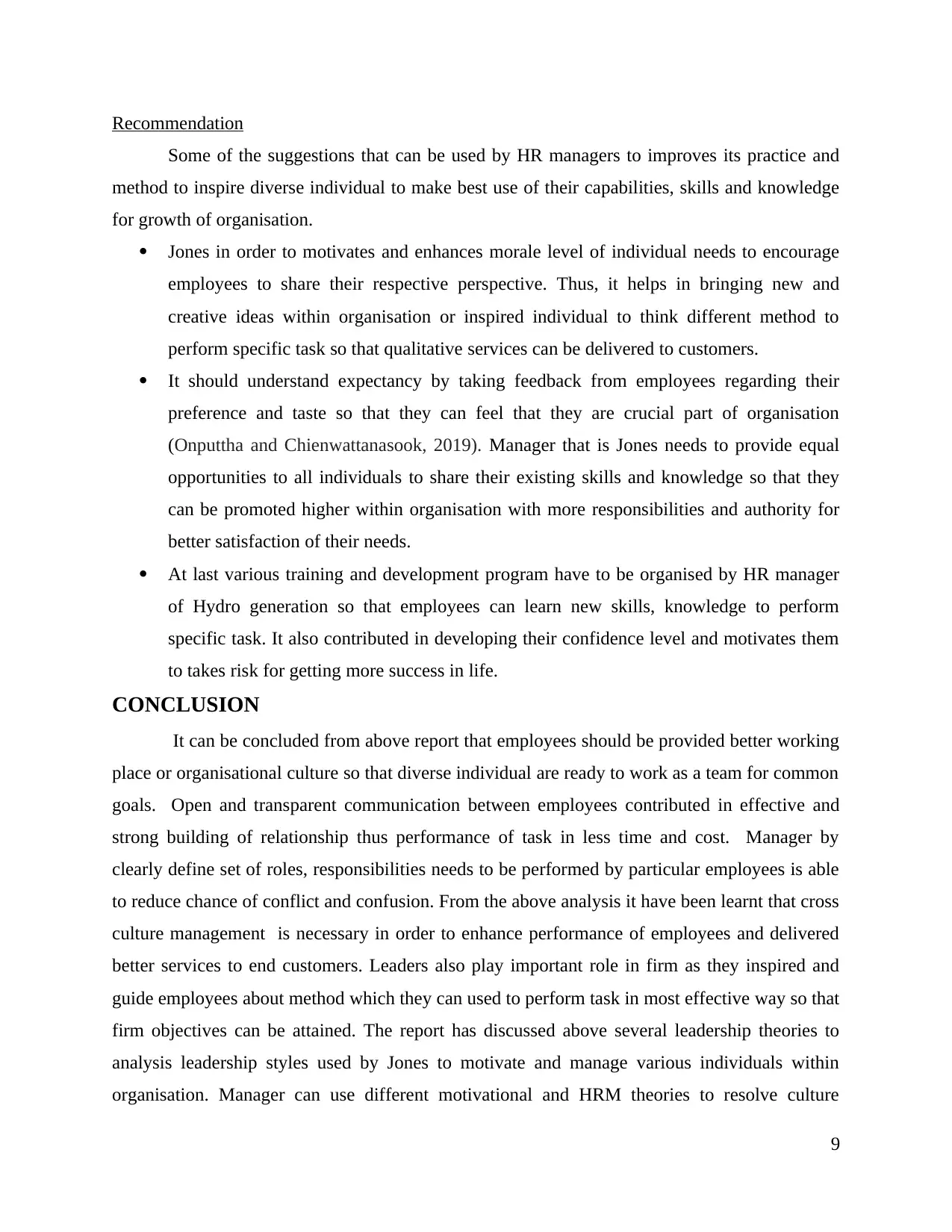
Recommendation
Some of the suggestions that can be used by HR managers to improves its practice and
method to inspire diverse individual to make best use of their capabilities, skills and knowledge
for growth of organisation.
Jones in order to motivates and enhances morale level of individual needs to encourage
employees to share their respective perspective. Thus, it helps in bringing new and
creative ideas within organisation or inspired individual to think different method to
perform specific task so that qualitative services can be delivered to customers.
It should understand expectancy by taking feedback from employees regarding their
preference and taste so that they can feel that they are crucial part of organisation
(Onputtha and Chienwattanasook, 2019). Manager that is Jones needs to provide equal
opportunities to all individuals to share their existing skills and knowledge so that they
can be promoted higher within organisation with more responsibilities and authority for
better satisfaction of their needs.
At last various training and development program have to be organised by HR manager
of Hydro generation so that employees can learn new skills, knowledge to perform
specific task. It also contributed in developing their confidence level and motivates them
to takes risk for getting more success in life.
CONCLUSION
It can be concluded from above report that employees should be provided better working
place or organisational culture so that diverse individual are ready to work as a team for common
goals. Open and transparent communication between employees contributed in effective and
strong building of relationship thus performance of task in less time and cost. Manager by
clearly define set of roles, responsibilities needs to be performed by particular employees is able
to reduce chance of conflict and confusion. From the above analysis it have been learnt that cross
culture management is necessary in order to enhance performance of employees and delivered
better services to end customers. Leaders also play important role in firm as they inspired and
guide employees about method which they can used to perform task in most effective way so that
firm objectives can be attained. The report has discussed above several leadership theories to
analysis leadership styles used by Jones to motivate and manage various individuals within
organisation. Manager can use different motivational and HRM theories to resolve culture
9
Some of the suggestions that can be used by HR managers to improves its practice and
method to inspire diverse individual to make best use of their capabilities, skills and knowledge
for growth of organisation.
Jones in order to motivates and enhances morale level of individual needs to encourage
employees to share their respective perspective. Thus, it helps in bringing new and
creative ideas within organisation or inspired individual to think different method to
perform specific task so that qualitative services can be delivered to customers.
It should understand expectancy by taking feedback from employees regarding their
preference and taste so that they can feel that they are crucial part of organisation
(Onputtha and Chienwattanasook, 2019). Manager that is Jones needs to provide equal
opportunities to all individuals to share their existing skills and knowledge so that they
can be promoted higher within organisation with more responsibilities and authority for
better satisfaction of their needs.
At last various training and development program have to be organised by HR manager
of Hydro generation so that employees can learn new skills, knowledge to perform
specific task. It also contributed in developing their confidence level and motivates them
to takes risk for getting more success in life.
CONCLUSION
It can be concluded from above report that employees should be provided better working
place or organisational culture so that diverse individual are ready to work as a team for common
goals. Open and transparent communication between employees contributed in effective and
strong building of relationship thus performance of task in less time and cost. Manager by
clearly define set of roles, responsibilities needs to be performed by particular employees is able
to reduce chance of conflict and confusion. From the above analysis it have been learnt that cross
culture management is necessary in order to enhance performance of employees and delivered
better services to end customers. Leaders also play important role in firm as they inspired and
guide employees about method which they can used to perform task in most effective way so that
firm objectives can be attained. The report has discussed above several leadership theories to
analysis leadership styles used by Jones to motivate and manage various individuals within
organisation. Manager can use different motivational and HRM theories to resolve culture
9
⊘ This is a preview!⊘
Do you want full access?
Subscribe today to unlock all pages.

Trusted by 1+ million students worldwide
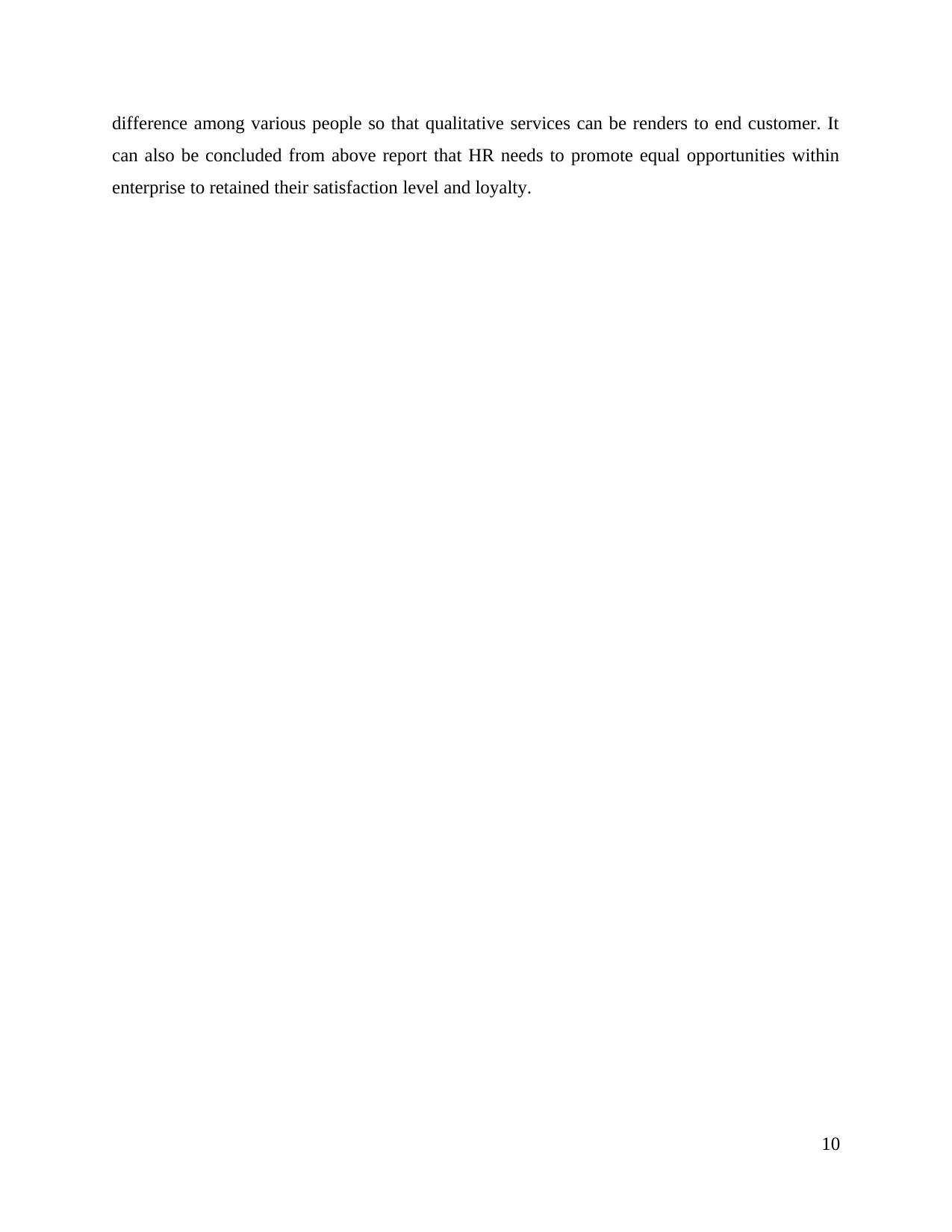
difference among various people so that qualitative services can be renders to end customer. It
can also be concluded from above report that HR needs to promote equal opportunities within
enterprise to retained their satisfaction level and loyalty.
10
can also be concluded from above report that HR needs to promote equal opportunities within
enterprise to retained their satisfaction level and loyalty.
10
Paraphrase This Document
Need a fresh take? Get an instant paraphrase of this document with our AI Paraphraser
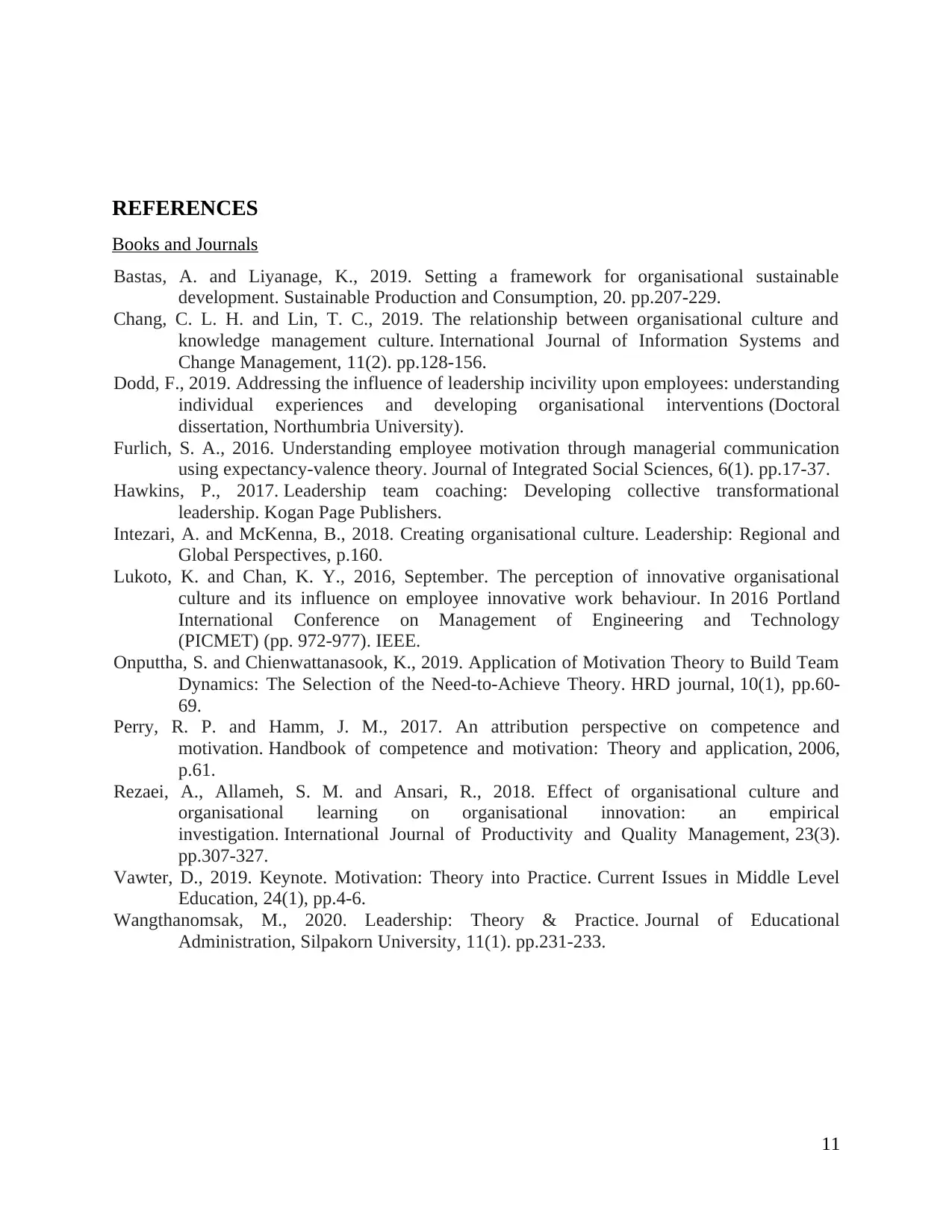
REFERENCES
Books and Journals
Bastas, A. and Liyanage, K., 2019. Setting a framework for organisational sustainable
development. Sustainable Production and Consumption, 20. pp.207-229.
Chang, C. L. H. and Lin, T. C., 2019. The relationship between organisational culture and
knowledge management culture. International Journal of Information Systems and
Change Management, 11(2). pp.128-156.
Dodd, F., 2019. Addressing the influence of leadership incivility upon employees: understanding
individual experiences and developing organisational interventions (Doctoral
dissertation, Northumbria University).
Furlich, S. A., 2016. Understanding employee motivation through managerial communication
using expectancy-valence theory. Journal of Integrated Social Sciences, 6(1). pp.17-37.
Hawkins, P., 2017. Leadership team coaching: Developing collective transformational
leadership. Kogan Page Publishers.
Intezari, A. and McKenna, B., 2018. Creating organisational culture. Leadership: Regional and
Global Perspectives, p.160.
Lukoto, K. and Chan, K. Y., 2016, September. The perception of innovative organisational
culture and its influence on employee innovative work behaviour. In 2016 Portland
International Conference on Management of Engineering and Technology
(PICMET) (pp. 972-977). IEEE.
Onputtha, S. and Chienwattanasook, K., 2019. Application of Motivation Theory to Build Team
Dynamics: The Selection of the Need-to-Achieve Theory. HRD journal, 10(1), pp.60-
69.
Perry, R. P. and Hamm, J. M., 2017. An attribution perspective on competence and
motivation. Handbook of competence and motivation: Theory and application, 2006,
p.61.
Rezaei, A., Allameh, S. M. and Ansari, R., 2018. Effect of organisational culture and
organisational learning on organisational innovation: an empirical
investigation. International Journal of Productivity and Quality Management, 23(3).
pp.307-327.
Vawter, D., 2019. Keynote. Motivation: Theory into Practice. Current Issues in Middle Level
Education, 24(1), pp.4-6.
Wangthanomsak, M., 2020. Leadership: Theory & Practice. Journal of Educational
Administration, Silpakorn University, 11(1). pp.231-233.
11
Books and Journals
Bastas, A. and Liyanage, K., 2019. Setting a framework for organisational sustainable
development. Sustainable Production and Consumption, 20. pp.207-229.
Chang, C. L. H. and Lin, T. C., 2019. The relationship between organisational culture and
knowledge management culture. International Journal of Information Systems and
Change Management, 11(2). pp.128-156.
Dodd, F., 2019. Addressing the influence of leadership incivility upon employees: understanding
individual experiences and developing organisational interventions (Doctoral
dissertation, Northumbria University).
Furlich, S. A., 2016. Understanding employee motivation through managerial communication
using expectancy-valence theory. Journal of Integrated Social Sciences, 6(1). pp.17-37.
Hawkins, P., 2017. Leadership team coaching: Developing collective transformational
leadership. Kogan Page Publishers.
Intezari, A. and McKenna, B., 2018. Creating organisational culture. Leadership: Regional and
Global Perspectives, p.160.
Lukoto, K. and Chan, K. Y., 2016, September. The perception of innovative organisational
culture and its influence on employee innovative work behaviour. In 2016 Portland
International Conference on Management of Engineering and Technology
(PICMET) (pp. 972-977). IEEE.
Onputtha, S. and Chienwattanasook, K., 2019. Application of Motivation Theory to Build Team
Dynamics: The Selection of the Need-to-Achieve Theory. HRD journal, 10(1), pp.60-
69.
Perry, R. P. and Hamm, J. M., 2017. An attribution perspective on competence and
motivation. Handbook of competence and motivation: Theory and application, 2006,
p.61.
Rezaei, A., Allameh, S. M. and Ansari, R., 2018. Effect of organisational culture and
organisational learning on organisational innovation: an empirical
investigation. International Journal of Productivity and Quality Management, 23(3).
pp.307-327.
Vawter, D., 2019. Keynote. Motivation: Theory into Practice. Current Issues in Middle Level
Education, 24(1), pp.4-6.
Wangthanomsak, M., 2020. Leadership: Theory & Practice. Journal of Educational
Administration, Silpakorn University, 11(1). pp.231-233.
11
1 out of 11
Related Documents
Your All-in-One AI-Powered Toolkit for Academic Success.
+13062052269
info@desklib.com
Available 24*7 on WhatsApp / Email
![[object Object]](/_next/static/media/star-bottom.7253800d.svg)
Unlock your academic potential
Copyright © 2020–2026 A2Z Services. All Rights Reserved. Developed and managed by ZUCOL.





